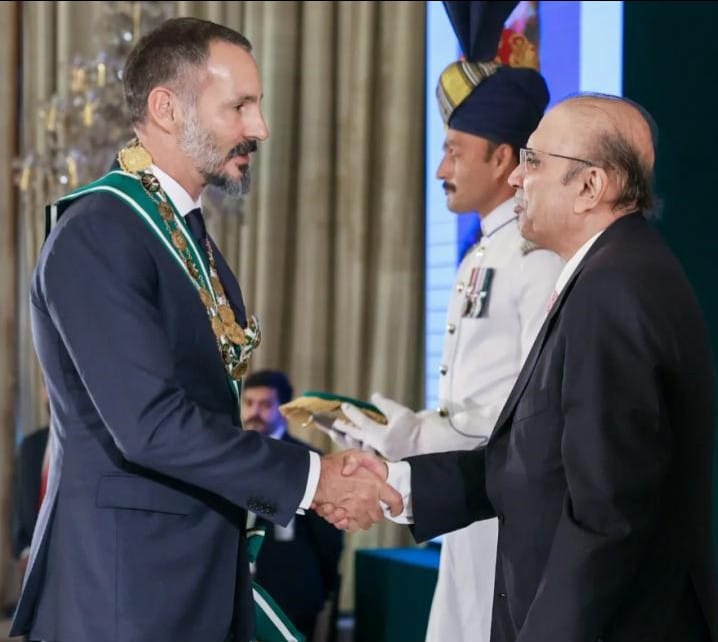Prnce Rahim Al-Hussaini, now Aga Khan V, has assumed leadership as the 50th hereditary Imam of the Shiite Ismaili Muslims following the passing of his father, Aga Khan IV. Born on October 12, 1971, in Geneva, Switzerland, Prince Rahim carries forward a lineage that spans more than 1,300 years, with Ismaili followers believing the Aga Khan to be a direct descendant of the Prophet Muhammad.
Early Life and Education
Prince Rahim is the eldest son of the late Aga Khan IV and his first wife, Princess Salimah. His upbringing was marked by exposure to both Western and Eastern traditions, reflecting the Ismaili community’s global presence. He received his early education at Phillips Academy Andover in the United States before earning a Bachelor of Arts in Comparative Literature from Brown University in 1995. He later pursued graduate studies in management and administration at IESE Business School, University of Navarra, in Barcelona, Spain.
Philanthropy and Development Work

For decades, Prince Rahim has played a vital role in the Aga Khan Development Network (AKDN), one of the world’s largest private development networks. The organization focuses on economic development, education, healthcare, and cultural preservation in Asia, Africa, and the Middle East. Serving on the boards of various AKDN agencies, he has championed initiatives aimed at improving the quality of life for Ismailis and vulnerable communities worldwide.
A strong advocate for environmental sustainability, Prince Rahim has led efforts to address climate change, serving as Chairman of AKDN’s Environment and Climate Committee. Under his guidance, AKDN has invested in sustainable infrastructure, disaster preparedness, and initiatives aimed at mitigating environmental degradation in developing regions. His focus on poverty alleviation aligns with his father’s legacy of fostering self-reliance through education and entrepreneurship.
Personal Life and Family
Prince Rahim married American fashion model Kendra Irene Spears, who adopted the title Princess Salwa Aga Khan upon converting to Islam. The couple wed in a private ceremony at the Château de Bellerive in Switzerland in 2013 and had two sons, Prince Irfan (born 2015) and Prince Sinan (born 2017). However, their marriage ended in divorce in February 2022.
Princess Salwa, born on August 5, 1988, rose to prominence in the fashion industry, working with major luxury brands such as Gucci, Christian Lacroix, and Valentino. She graced the covers of top fashion magazines, including Vogue and Elle, before stepping away from modeling following her marriage into the Ismaili royal family.
The Ismaili Community and Its Global Presence
The Ismaili community, numbering approximately 15 million, has a widespread presence across Central and South Asia, the Middle East, Africa, and the Western world. While historically centered in Persia and later in India and Pakistan, the community has expanded globally, with significant populations in Canada, the United States, and Europe. Lisbon serves as the headquarters of the Ismaili Imamate, reflecting Portugal’s status as a hub for Ismaili Muslims.
At its peak, the Ismaili dynasty ruled the Fatimid Caliphate, a powerful empire spanning North Africa, the Middle East, and parts of Sicily during the 10th to 12th centuries. Though the imams have not held political power for centuries, they continue to play a vital spiritual and social role for their followers.
A Legacy of Wealth and Influence
The Aga Khan lineage has long been associated with immense wealth and global influence. Aga Khan IV, who passed away on February 4, 2025, at the age of 88, was estimated to have a fortune ranging from $1 billion to $13 billion. The wealth of the Ismaili Imamate stems from diversified investments, including stakes in airlines, real estate, and media enterprises, as well as voluntary financial contributions from Ismaili followers. Ismailis traditionally donate up to 12.5% of their income to support community projects managed by the Aga Khan.
Despite his considerable wealth, Aga Khan IV was widely respected for his commitment to philanthropy, with AKDN spearheading transformative projects in education, healthcare, and economic development. Forbes consistently ranked him among the world’s wealthiest royals, though his fortune has always been primarily directed toward humanitarian initiatives rather than personal luxury.
The Road Ahead for Aga Khan V
As Aga Khan V, Prince Rahim inherits not only a spiritual mantle but also a vast global philanthropic enterprise. His leadership will be closely watched as he navigates the challenges of modernizing the Ismaili Imamate while staying true to its centuries-old traditions. His commitment to sustainability, education, and economic empowerment signals a continuity of his father’s vision, though he is expected to bring his own approach to governance.
His tenure will likely emphasize digital transformation, ensuring that the Ismaili community and AKDN remain at the forefront of global development efforts. With climate change posing a growing threat to many Ismaili-populated regions, his focus on environmental resilience is expected to intensify. Additionally, as geopolitical landscapes shift, his leadership may involve forging new partnerships and strengthening the community’s position on the world stage.
With a rich history behind him and a forward-looking vision, Aga Khan V’s leadership marks the beginning of a new chapter for the Ismaili world—one rooted in tradition yet attuned to the pressing challenges of the 21st century.


